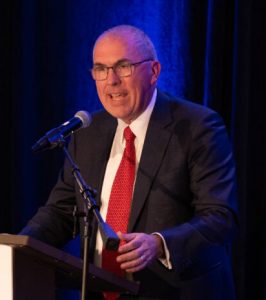The $2.5 million to $5 million reportedly needed to launch an independent commission to address and prevent claims of sexual abuse in Southern Baptist Convention churches will not come from the SBC’s two mission boards, their presidents said Feb. 21.
Just two days earlier, Josh Wester, chairman of the SBC’s Abuse Reform Implementation Task Force, reported to the SBC Executive Committee plans to launch the new nonprofit as a way to create and maintain an online database of known clergy sexual abusers and to produce resources for churches to deal with and prevent abuse.
The task force reportedly had hoped to tap some or all of $4 million in funding set aside for sexual abuse reforms from Send Relief, a cooperative effort between the SBC International Mission Board and North American Mission Board to provides ministries of compassion at home and abroad. That money — $3 million for sexual abuse and $1 million of “seed funding” for survivor care — was announced last June before the SBC annual meeting.
But it was not intended to fund a new independent entity, NAMB President Kevin Ezell and IMB President Paul Chitwood said in collaboration with Bryant Wright, head of Send Relief.
“While we share a desire to support abuse reforms, many details remain unclear about the proposed ARC’s mission, legal structure, leadership and accountability,” the three said in a statement. “Though Send Relief funds are not available for a non-SBC organization, they do remain available to the ARITF for its assigned work within the SBC.”
“Those funds have never been committed to help form a separate organization outside the SBC.”
“Those funds have never been committed to help form a separate organization outside the SBC, such as the proposed Abuse Response Commission,” the statement added.
The two mission board presidents hold immense sway in the SBC in part because they are the ones with the money. The IMB gets 51% of all money given to the national Cooperative Program unified budget, and NAMB gets 23%. Both mission boards also benefit from named annual offerings that bring in tens of millions of additional income every year.
Chitwood, Ezell and Wright emphasized that the $4 million earlier made available to the task force did not come from Cooperative Program gifts. How Send Relief had $4 million in “undesignated” funds available to share is not clear.

SBC Abuse Reform Implementation Task Force members Mike Keahbone and Josh Wester speak at a press conference after the SBC Executive Committee’s meeting in Nashville Feb. 20. (Photo by Brandon Porter)
The SBC Executive Committee has no money to launch the new entity, as it already has spent at least $7 million in the last two years on investigations and responses and settlements related to sexual abuse claims. Its net assets have been reduced by more than half, causing auditors last year to label the financial future of the Executive Committee “unsustainable.”
And while the SBC Ethics and Religious Liberty Commission president has pledged to help secure the money needed for the new commission, the ERLC gets the least amount of money from the Cooperative Program compared to the mission boards and seminaries.
The dilemma faced in rounding up funding to create the new commission mirrors a financial reality that has hampered the response to sexual abuse claims from the beginning: Full responsibility falls on the SBC Executive Committee, which does not have the staff or the financial resources to do the required work.
Meanwhile, mission board and seminary presidents say they favor the abuse reforms but don’t believe it is their responsibility to fund them with Cooperative Program or mission offering money.
One of the intents of creating the new Abuse Response Commission is to set the Executive Committee free from the burden of singlehandedly managing the response to sexual abuse claims.
Baptist Press reported Feb. 21: “One goal for the new organization is to protect the SBC and the SBC EC from liability, Wester said. The ARC also fulfills one of the recommendations that came out of the report from Guidepost Solutions on its investigation of how the SBC EC handled sexual abuse claims over a 20-year period — that a permanent home be found for sexual abuse prevention and response in the SBC.”
Wester told BP the incorporators of the new nonprofit in South Carolina will be Wester, former ARITF chairman Marshall Blalock and current ARITF members Melissa Bowen, Brad Eubank, Mike Keahbone and John Nelson. He said a trustee board to oversee the commission’s work will be small and will be made up of those who are passionate about sexual abuse reform.
BP reported the group seeks $2.5 million in initial startup costs. Other SBC insiders have placed the amount needed closer to $5 million.

Bart Barber
Meanwhile, SBC President Bart Barber backtracked and apologized for comments he made Monday evening, Feb. 19, about the new commission. He called Wester to the podium and asked if he was aware the SBC has no money. Then he reached in his wallet and pulled out a $100 bill as a gift to help launch the commission.
As Wester returned to his seat, Barber joked about using “Monopoly money” to address sexual abuse reforms in the SBC. Given the immediate and harsh response Barber received from the survivor community, he needed a “Get Out of Jail Free” card.
Later that night, he tweeted: “I’ve just gotten back to the hotel room and have found out that the ‘Monopoly money’ thing I said tonight was really bad judgement on my part and did not communicate well my seriousness about this task. I gave real money to Josh. I meant it sincerely. Southern Baptists are going to need to come together to provide real funding for sexual abuse. Sometimes my sense of humor ain’t great. The whole address was about not my sense of humor but about my sense of duty. And my sense of duty is what drives me to see abuse reform all the way through to real accomplishment.”
Related articles:
From 1925 to 2024: Why the SBC’s funding formula is being questioned a century later


